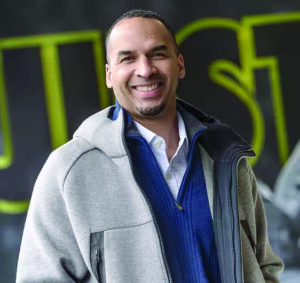By David Mullen
Dallas Mavericks GM Nico Harrison publicly addressed the press on April 21, after meeting with some of them behind closed doors less than a week before. The takeaway was the same.
On February 1, Harrison inexplicably traded five-time All-NBA superstar forward Luka Dončić, whose NBA career began as a 19-year-old in Dallas, to the reviled Los Angeles Lakers for aging and often injured forward Anthony Davis, backup guard Max Christie and a 2029 first round draft pick.

Photo courtesy of Kelly Gorham/MSUBobcats.com
Mavs fans were stunned. They had watched Dončić grow up before their very eyes. He was the most popular professional athlete in Dallas, bar none. Sorry Dak Prescott, Jamie Benn or Adolis Garcia. Dončić was the man.
Harrison did not understand the emotional and financial investment that Dallas Mavericks fans have made in the franchise. He made a trade he didn’t have to make and feels uncomfortable with the interrogation.
The Mavericks were coming off an NBA Finals appearance in 2023-24. In the offseason, Harrison said that the acquisition of Klay Thompson was the one player needed to get the Mavericks to an NBA title. What changed? Harrison won’t tell us.
It seemed destined that Dončić would take the face-of-the-franchise torch from Mavericks’ legend Dirk Nowitzki, who played his entire 21-year career in Dallas. Nowitzki came to Dallas from Germany and Dončić came from Slovenia having never played in college. Nowitzki took Dončić under his wing — the Hall of Famer mentoring the prodigy — as teammates in 2018-19. Nowitzki and Dončić remained close after Nowitzki’s retirement in 2019.
In canonical terms, Dončić was the chosen one. But Harrison decided that the 25-year-old, five-time All Star was the problem, not the solution. Tell us why.
Head coach Jason Kidd said he wasn’t aware the trade was in the works. Neither did former Mavericks owner Mark Cuban. Only Mavericks governor Patrick Dumont, son-in-law of Mavericks owner and casino magnate Miriam Adelson, knew about the deal. “I knew Luka was important to the fan base,” Harrison said at the press conference. “I didn’t quite know it to what level.”
To appreciate the fan base of the Mavericks, it might help to understand the 45-year history of the team. Harrison was nine years old in 1980 when the brand-new Dallas Mavericks christened Reunion Arena against the San Antonio Spurs. The Mavericks would win the opener and only 14 more games that season.
But it didn’t matter. Dallasites always felt Dallas was a major league city and now the city had a pro team not based in Irving or Arlington. The Stars arrival was more than a decade away. The Mavs were Dallas’ team, and the fans embraced them, failures and all. Mavs fans tolerated the quirkiness of owner Don Carter, partner Norm Sonju and GM Rick Sund. It didn’t take long in NBA years before the Mavs were competitive with key players like Mark Aguirre, Rolondo Blackman and Derek Harper. Fans prayed for Roy Tarpley’s health on and off the court and that — just once — Dallas could beat the Lakers. They never could.
But these Mavs had heart. They played hard and were well coached by Dick Motta. Reunion Arena was rowdy, spurred on by PA announcer Kevin McCarthy’s simple post-timeout declaration, “Your Dallas Mavericks … and their fans!” Mavericks’ fans were — and always have been — engaged.
Mark Cuban was a basketball fan. As solid seasons returned to laughable, Cuban said he could run the Mavericks better than the current management. It helped that he had more money than anyone in the arena. He held true to his word. Under Cuban, the Mavs became relevant again. He was also quirky but always seemed to have the fan’s best interests at heart. It wasn’t about the money. It was about winning. Led by Nowitzki, the Mavs won the NBA Championship in 2010-11.
Recently, the team seemed to be on the way to another championship run. But suddenly, Cuban was gone. He took a buyout in early 2024. At then 65, he couldn’t be blamed. Cuban’s spirit that he instilled in the Mavericks fan base was uprooted by a family that made their money taking other people’s money. Adleman appointed her son-in-law Dumont to keep an eye on things while learning on the job. Just weeks after trading Dončić, the Mavericks announced season tickets would go up by an average of 8.61 percent next season. ESPN reported that the increase is due “to ongoing investments in the team and fan engagement.” How can a franchise be so out of touch with their fan base?
At 25, Dončić is still not fully mature. He complains too often to the officials and is brash and cocky. But he has more basketball skills than any player in franchise history and is the type of player necessary to build a championship legacy. The Lakers certainly thought so. Harrison and the Adleman clan did not. The lack of transparency conveyed by Harrison is just one example of why the “Fire Nico!” chant has become No. 1 on the hit parade of Mavericks fans. Harrison seems taken aback by the backlash.
“Defense wins championships,” Harrison said. While statistically, that is arguable, does that mean you traded Dončić because he was a defensive liability? Harrison won’t say. He dwells on team chemistry. So, was Dončić a bad teammate? Harrison won’t say.
The Dončić deal was made by Harrison. But when you are playing with someone’s passion and pocketbook, you’d better have a good reason why.
“I think I have done a really good job here,” Harrison said. “I don’t think I can be judged by the injuries this year. I think I should be judged by the totality from end to end.” No, no, Nico. Mid-season acquisitions like Spencer Dinwiddie or P.J. Armstrong or a knee injury to Kyrie Irving is not how you will be judged. You broke up a competitive team while breaking the hearts of Mavs fans. Why?
